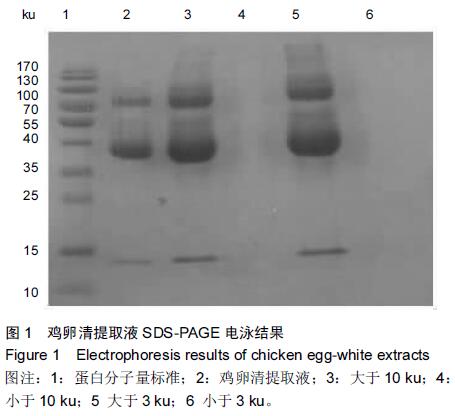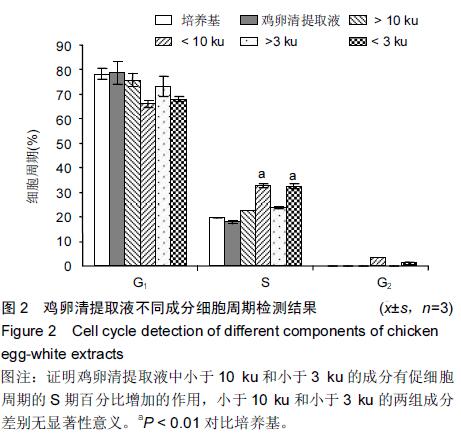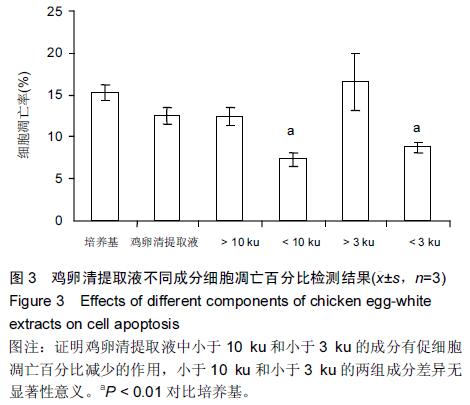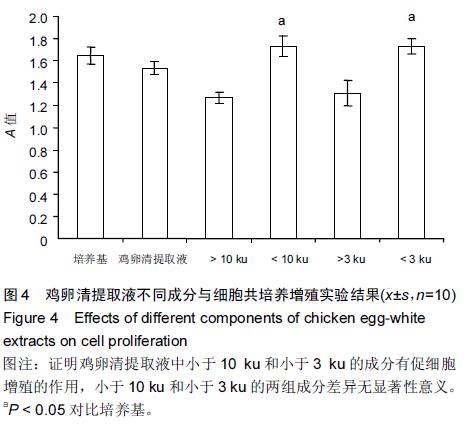| [1] Sun G, Liu Q, Cheng Y, et al. B cell translocation gene 1 reduces the biological outcome of kidney cancer through induction of cell proliferation, cell cycle arrest, cell apoptosis and cell metastasis. Int J Mol Med. 2015; 35(3): 777-783.
[2] Guichard A, Humbert P, Tissot M, et al. Effects of topical corticosteroids on cell proliferation, cell cycle progression and apoptosis: in vitro comparison on HaCaT. Int J Pharm. 2015; 479(2): 422-429.
[3] 阮光萍, 王金祥, 刘菊芬, 等. 鸡卵清提取液中小于3kDa的成分有促细胞增殖的作用[J]. 中国细胞生物学学报,2014, 36(10): 1350-1354.
[4] Ufkin ML, Peterson S, Yang X, et al. miR-125a regulates cell cycle, proliferation, and apoptosis by targeting the ErbB pathway in acute myeloid leukemia. Leuk Res. 2014; 38(3): 402-410.
[5] Wang H, Yu J, Zhang L, et al. RPS27a promotes proliferation, regulates cell cycle progression and inhibits apoptosis of leukemia cells. Biochem Biophys Res Commun. 2014; 446(4): 1204-1210.
[6] Yang Y, Zhao Y, Ai X, et al. Formononetin suppresses the proliferation of human non-small cell lung cancer through induction of cell cycle arrest and apoptosis. Int J Clin Exp Pathol. 2014; 7(12): 8453-8461.
[7] Guardavaccaro D, Corrente G, Covone F, et al. Arrest of G(1)-S progression by the p53-inducible gene PC3 is Rb dependent and relies on the inhibition of cyclin D1 transcription. Mol Cell Biol. 2000; 20(5): 1797-1815.
[8] Manzano-Moreno FJ, Ramos-Torrecillas J, De Luna-Bertos E, et al. High doses of bisphosphonates reduce osteoblast-like cell proliferation by arresting the cell cycle and inducing apoptosis. J Craniomaxillofac Surg. 2015; 43(3): 396-401.
[9] Tang SH, Pei RZ, Ma JX, et al. [Effects of H3K27 methylation inhibitor EPZ005687 on apoptosis, proliferation and cell cycle of U937 cells and normal CD34 positive cells]. Zhongguo Shi Yan Xue Ye Xue Za Zhi. 2014; 22(6): 1561-1566.
[10] Tong ZG, Liu N, Song HS, et al. Cytochalasin B inhibits the proliferation of human glioma U251 cells through cell cycle arrest and apoptosis. Genet Mol Res. 2014; 13(4): 10811-10822.
[11] Song H, Xu W, Song J, et al. Overexpression of Lin28 inhibits the proliferation, migration and cell cycle progression and induces apoptosis of BGC-823 gastric cancer cells. Oncol Rep.2015; 33(2): 997-1003.
[12] Cao JJ, Zhao XM, Wang DL, et al. YAP is overexpressed in clear cell renal cell carcinoma and its knockdown reduces cell proliferation and induces cell cycle arrest and apoptosis. Oncol Rep.2014; 32(4): 1594-1600.
[13] Casella ML, Parody JP, Ceballos MP, et al.Quercetin prevents liver carcinogenesis by inducing cell cycle arrest, decreasing cell proliferation and enhancing apoptosis. Mol Nutr Food Res.2014; 58(2): 289-300.
[14] Damasceno FS, Barison MJ, Pral EM, et al. Memantine, an antagonist of the NMDA glutamate receptor, affects cell proliferation, differentiation and the intracellular cycle and induces apoptosis in Trypanosoma cruzi. PLoS Negl Trop Dis. 2014; 8(2): e2717.
[15] Deng G, Hu C, Zhu L, et al. Downregulation of ROS-FIG inhibits cell proliferation, colonyformation, cell cycle progression, migration and invasion, while inducing apoptosis in intrahepatic cholangiocarcinoma cells. Int J Mol Med. 2014; 34(3): 661-668.
[16] Estevez H, Garcia-Lidon JC, Luque-Garcia JL, et al. Effects of chitosan-stabilized selenium nanoparticles on cell proliferation, apoptosis and cell cycle pattern in HepG2 cells: comparison with other selenospecies. Colloids Surf B Biointerfaces. 2014; 122: 184-193.
[17] Han Y, Yang YN, Yuan HH, et al. UCA1, a long non-coding RNA up-regulated in colorectal cancer influences cell proliferation, apoptosis and cell cycle distribution. Pathology. 2014; 46(5): 396-401.
[18] Jarzab A, Grabarska A, Kielbus M, et al. Osthole induces apoptosis, suppresses cell-cycle progression and proliferation of cancer cells. Anticancer Res. 2014; 34(11): 6473-6480.
[19] Kohda T, Sakuma S, Abe M, et al. Monochloramine suppresses the proliferation of colorectal cancer cell line Caco-2 by both apoptosis and G2/M cell cycle arrest. Cell Biochem Funct. 2014; 32(2): 188-193.
[20] Li X, He X, Tian W, et al. Short hairpin RNA targeting Notch2 inhibits U87 human glioma cell proliferation by inducing cell cycle arrest and apoptosis in vitro and in vivo. Mol Med Rep. 2014; 10(6): 2843-2850.
[21] Liu B, Gao YQ, Wang XM, et al. Germacrone inhibits the proliferation of glioma cells by promoting apoptosis and inducing cell cycle arrest. Mol Med Rep. 2014; 10(2): 1046-1050.
[22] Liu B, Zhou Z, Zhou W, et al. Resveratrol inhibits proliferation in human colorectal carcinoma cells by inducing G1/Sphase cell cycle arrest and apoptosis through caspase/cyclinCDK pathways. Mol Med Rep. 2014; 10(4): 1697-1702.
[23] Liu RY and Li JP. Saikosaponin-d inhibits proliferation of human undifferentiated thyroid carcinoma cells through induction of apoptosis and cell cycle arrest. Eur Rev Med Pharmacol Sci. 2014; 18(17): 2435-2443.
[24] Mohamed MF, Mohamed MS, Fathi MM, et al. Chalcones incorporated pyrazole ring inhibit proliferation, cell cycle progression, angiogenesis and induce apoptosis of MCF7 cell line. Anticancer Agents Med Chem. 2014; 14(9): 1282-1292.
[25] Park HY, Kim GY, Moon SK, et al. Fucoidan inhibits the proliferation of human urinary bladder cancer T24 cells by blocking cell cycle progression and inducing apoptosis. Molecules. 2014; 19(5): 5981-5998.
[26] Qi Z, Liu M, Liu Y, et al.Tetramethoxychalcone, a chalcone derivative, suppresses proliferation, blocks cell cycle progression, and induces apoptosis of human ovarian cancer cells. PLoS One. 2014; 9(9): e106206.
[27] Sikdar S, Mukherjee A, Ghosh S, et al. Condurango glycoside-rich components stimulate DNA damage-induced cell cycle arrest and ROS-mediated caspase-3 dependent apoptosis through inhibition of cell-proliferation in lung cancer, in vitro and in vivo. Environ Toxicol Pharmacol. 2014; 37(1): 300-314.
[28] Wang YX, Cai H, Jiang G, et al. Silibinin inhibits proliferation, induces apoptosis and causes cell cycle arrest in human gastric cancer MGC803 cells via STAT3 pathway inhibition. Asian Pac J Cancer Prev. 2014; 15(16): 6791-6798.
[29] Wilson JM, Kunnimalaiyaan S, Gamblin TC, et al. MK2206 inhibits hepatocellular carcinoma cellular proliferation via induction of apoptosis and cell cycle arrest. J Surg Res. 2014; 191(2): 280-285.
[30] Wu Z, Liu B, E C, et al. Resveratrol inhibits the proliferation of human melanoma cells by inducing G1/S cell cycle arrest and apoptosis. Mol Med Rep. 2015; 11(1): 400-404.
|



